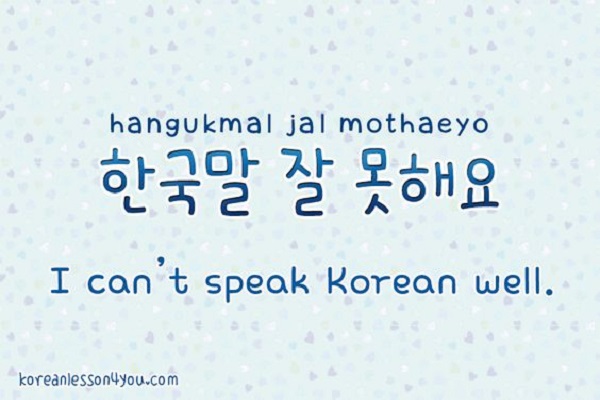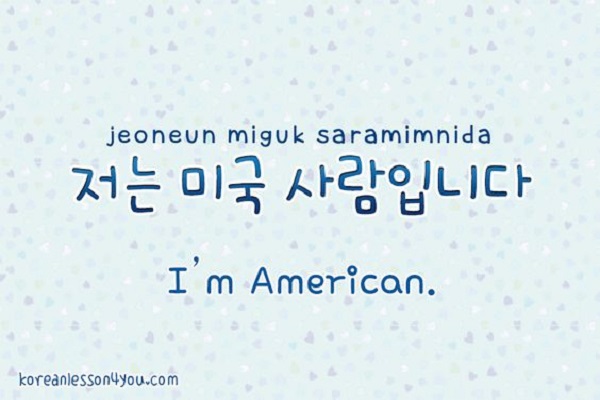Cụm từ quan trọng trong tiếng Hàn
Các cụm từ tiếng Hàn cơ bản và các cụm từ tiếng Hàn để gặp gỡ và chào mừng sẽ làm tiền đề cho cuộc đối thoại tiếng Hàn ở cuối, cũng như thể hiện cách những cụm từ sống động này được sử dụng trong đàm thoại tiếng Hàn.
Bài học tiếng Hàn được cung cấp ở đây là một đoạn trích từ chương trình tiếng Hàn của Transparent Language. Các cụm từ tiếng Hàn cơ bản và các cụm từ tiếng Hàn để gặp gỡ và chào mừng sẽ làm tiền đề cho cuộc đối thoại tiếng Hàn ở cuối, cũng như thể hiện cách những cụm từ sống động này được sử dụng trong đàm thoại tiếng Hàn. Hãy tìm nghe phát âm tiếng Hàn của một người nói tiếng Hàn tốt nhất là người bản xứ hoặc tiện ích trên mạng. Hãy tận dụng tài nguyên tiếng Hàn này khi bạn học nói tiếng Hàn!
Một lưu ý về cụm từ tiếng Hàn được chuyển ngữ:
Các cụm từ tiếng Hàn trên trang này được thể hiện bằng văn bản được phiên âm, sử dụng các chữ cái tiếng Anh, để những người bắt đầu nói tiếng Hàn có thể tập trung vào phát âm tiếng Hàn.

Từ vựng về thời tiết trong tiếng Hàn
Cụm từ tiếng Hàn cơ bản
>>Xem thêm: Bài học thứ 1: Học Hangul cơ bản Phần 3

Câu tiếng Hàn đơn giản
Cụm từ gặp gỡ và chào hỏi tiếng Hàn
>>Tham khảo: Sách hay cho người mới bắt đầu học tiếng Hàn Quốc

Cảnh đẹp ở xứ sở kim chi
Đoạn hội thoại

Câu tiếng Hàn đơn giản
Cụm từ tiếng Hàn hữu ích
Một tập hợp các cụm từ hữu ích bằng tiếng Hàn, hãy tìm các bản ghi âm để có thể nghe được chính xác âm thanh của nó.
>>Có thể bạn quan tâm: 4 quyển sách học tiếng Hàn hiệu quả
Viết tắt: frm = trang trọng, inf = không trang trọng
*Nguồn: dịch từ Internet
Một lưu ý về cụm từ tiếng Hàn được chuyển ngữ:
Các cụm từ tiếng Hàn trên trang này được thể hiện bằng văn bản được phiên âm, sử dụng các chữ cái tiếng Anh, để những người bắt đầu nói tiếng Hàn có thể tập trung vào phát âm tiếng Hàn.
Từ vựng về thời tiết trong tiếng Hàn
Cụm từ tiếng Hàn cơ bản
- neh. Yes. Đúng
- ah-nee-oh. No. Không
- jwe-song-ha-ji-mahn. Please. Vui lòng
- gahm-sah-hahm-ni-da. Thank you. Cảm ơn bạn
- chon-mahn-eh-yo. You're welcome. Không có gì
- sil-le-hahm-ni-da. Excuse me. Xin lỗi
- ahn-nyong-ha-se-yo. Good morning. Chào buổi sáng
- ahn-nyong-hee ga-se-yo. Good-bye. Tạm biệt
>>Xem thêm: Bài học thứ 1: Học Hangul cơ bản Phần 3

Câu tiếng Hàn đơn giản
Cụm từ gặp gỡ và chào hỏi tiếng Hàn
- yong-o-rul hahl-jool asim-ni-ka? Do you speak English? Bạn có nói tiếng Anh không?
- jeo-nun han-kook-o-rul jo-gum-bah-ke mo-tahm-ni-da. I only speak a little Korean. Tôi chỉ nói được một chút tiếng Hàn.
- song-ha-mi o-teo-ke dwe-si-ji-yo? What is your name? Tên bạn là gì?
- je-i-rum-eun Mee-Young im-ni-da. My name is Mee-Young. Tên tôi là Mee-Young.
- ahn-nyong-ha-se-yo? How are you? Bạn khoẻ không?
- neh jal-i-soum-ni-da. I'm fine, thank you. Tôi khoẻ, cảm ơn bạn.
- gahm-se-hahm-ni-da. I'm fine, thank you. Tôi khoẻ, cảm ơn bạn.
- mahn-na-bwep-ge dwe-o-seo bahn-gahp-soum-ni-da. I am very glad to meet you. Tôi rất vui khi gặp bạn.
- jal mo-dara dut-ge-soum-ni-da. I don't understand. Tôi không hiểu.
- mo-ra-go greo-shut-ji-yo? What did you say? Bạn đã nói gì vậy?
- jom-chon-chon-hee mahl-soum-hae joo-se-yo? Can you speak more slowly? Bạn có thể nói chậm lại được không?
- choong-boon-hee i-hae-hah-go i-soum-ni-da. I understand perfectly. Tôi không hiểu rõ.
>>Tham khảo: Sách hay cho người mới bắt đầu học tiếng Hàn Quốc

Cảnh đẹp ở xứ sở kim chi
Đoạn hội thoại
| Young-Sook: | ahn-nyong-ha-se-yo! Hello! Xin chào yong-o-rul hahl-jool a-se-yo? Do you speak English? Bạn có nói tiếng Anh không? |
| Store Clerk | jwe-song-hahm-nida. I'm sorry. Tôi xin lỗi. yong-o-rul hahl-jool mo-rum-nida. I do not speak English. Tôi không nói được tiếng Anh |
| Young-Sook: | jo-do han-koo-go-rul jo-gum-ba-ke motam-nida. Unfortunately, I only speak a little Korean. Thật không may, tôi chỉ nói được một ít tiếng Hàn. |
| Store Clerk: | gewn-chan-soum-nida. That's all right. Không sao đâu. i-hae-hahm-nida. I understand you. Tôi hiểu mà. |

Câu tiếng Hàn đơn giản
Cụm từ tiếng Hàn hữu ích
Một tập hợp các cụm từ hữu ích bằng tiếng Hàn, hãy tìm các bản ghi âm để có thể nghe được chính xác âm thanh của nó.
>>Có thể bạn quan tâm: 4 quyển sách học tiếng Hàn hiệu quả
Viết tắt: frm = trang trọng, inf = không trang trọng
| English | 한국어 (Korean) |
| Welcome | 환영합니다 (hwangyong-hamnida) |
| (General greeting) | 안녕하십니까 (annyeong-hasimnikka) - frm 안녕하세요 (annyeonghaseyo) - inf 안녕 (annyeong) - inf |
| Hello (on phone) | 여보세요 (yeoboseyo) |
| How are you? | 어떻게 지내세요? (eotteohke jinaeseyo?) 안녕하셨습니까? (an nyeong ha siut seum ni ka?) |
| Reply to 'How are you?' | 잘지내요 (jaljinaeyo) |
| Long time no see | 오랜만이다 (orenmanida) |
| What's your name? | 이름은 무엇입니까? (ireumeun mueosip nikka?) - inf 성함이 어떻게 되십니까? (sungham ee uttoke daesipnika?) - frm |
| My name is ... | 제 이름은 ... 입니다 (je ireum-eun ... imnida) |
| Where are you from? | 어디서 오셨어요? (eodiseo osyeosseoyo) |
| I'm from .. | 저는 ... 에서 왔어요 (jeoneun ... eseo wasseuyo) |
| Pleased to meet you | (mannaseo bangapseumnida) – frm 만나서 반가워요 (mannaseo bangawoyo) - inf |
| Good morning (Morning greeting) | 안녕하십니까 (annyeong hashimnikka) 좋은 아침 (joheun achim) |
| Good afternoon (Afternoon greeting) | 안녕하십니까 (annyeong hashimnikka) |
| Good evening (Evening greeting) | 안녕하십니까 (annyeong hashimnikka) 좋은 저녁 (joheun jeonyeok) |
| Good night | 안녕히 주무십시요 (annyeong-hi jumusipsio) - frm 잘자 (jal jja) - inf |
| Goodbye (Parting phrases) | 안녕 (annyeong) 안녕히 계세요 (annyeonghi gyeseyo) - you are leaving 안녕히 가세요 (annyeonghi gaseyo) - you are staying |
| Good luck! | 행운을 빌어요 (haeng un eul bil eo yo) – frm 행운을 빈다 (haeng un eul bin da) - inf |
| Cheers! Good Health! (Toasts used when drinking) | 건배 [乾杯] (geonbae) - lit. "dry glass" 위하여 (wihayeo) |
| Have a nice day | 좋은 하루 되세요 (joeun haru dweseyo) |
| Bon appetit / Have a nice meal | 잘 먹겠습니다 (jal meokkesseumnida) - before a meal 잘 먹었습니다 (jal meogeosseumnida) - after a meal 맛있게 드세요 (masitkke deuseyo) |
| Bon voyage / Have a good journey | |
| I don't know | 나도 몰라 (nado molla) |
| I understand | 아랐어 (araso) 아랐어요 (arasoyo) |
| I don't understand | 모르겠습니다 (moreugesseumnida) |
| Please speak more slowly | 천천히 말씀해 주세요 (cheoncheonhi malssuemhae juseyo) |
| Please say that again | 다시 한번 말씀해주시겠어요? (tashi hanbŏn malssŭmaejushigessŏyo?) |
| Please write it down | 적어 주세요! (cheogeo juseyo!) |
| Do you speak Korean? | 한국말 하실 줄 아세요? (hangukmal hasil jul aseyo?) - frm 한국말 할 줄 아니? (hangukmal hal jul ani?) - inf |
| Yes, a little (reply to 'Do you speak ...?') | 예, 조금요 (ye, jogeumyo) - frm 응, 조금 (eung, jogeum) - inf |
| How do you say ... in Korean? | ... 를 한국말로 어떻게 말해요? (... reul hangukmal-lo eotteoh-ge maraeyo?) |
| Excuse me | 실례하겠습니다! (shillehagessumnida) |
| How much is this? | 이게 얼마예요? (ige eolmayeyo?) |
| Sorry | 미안합니다! (mianhamnida) - frm 죄송합니다 (joesonghamnida) - vfrm 미안(해) (mian(hae)) - inf |
| Please | 부탁합니다 (butakamnida) |
| Thank you | 감사합니다 (kamsahamnida) - frm 고맙습니다 (komapsumnida) - frm 고마워 (komawo) - inf |
| Reply to thank you | 아니에요 (anieyo) |
| Where's the toilet? | 화장실이 어디예요? (hwajangsiri eodiyeyo) |
| Do you come here often? | 자주 이리하십니까? (jaju ilihasibnikka?) |
| I miss you | 보고싶다 (bogoshipda) |
| I love you | 사랑해 (sarang hae) |
| Go away! | 저리 가세요! (juri gaseyo) |
| Leave me alone! | 혼자 내버려 두십시오! (honja naebeoryeo dushipshio) |
| Christmas and New Year greetings | 즐거운 성탄절 보내시고 새해 복 많이 받으세요 (jeulgeoun seongtanjeol bonaesigo saehae bok manhi bateusaeyo) |
| Easter greetings | 행복한 부활절이 되시길 (haengpoghan puhwarcheori toesikir) |
| Birthday greeting | 생일 축하합니다 (saeng-il chukha hamnida) - frm 생일 축하드립니다 (saeng-il chukha deurimnida) - frm 생신 축하드립니다 (saengsin chukha deurimnida) - frm 생일 축하해 (saeng-il chukha hae) - inf |
| One language is never enough | 한 가지 언어는 충분하지 못 해 (han gaji eon-eoneun chungbunhaji mos hae) 언어 하나론 부족해 (eoneo hanaron bujokhae) |
| My hovercraft is full of eels Why this phrase? | 내 호버크라프트는 장어로 가득 차 있어요 (Nae hoebuhkeurapeuteuneun changuhro kadeuk cha isseyo) |
*Nguồn: dịch từ Internet
Tin liên quan
Tiếng Hàn Giao Tiếp
- Những trung tâm tiếng Hàn giá rẻ tại TP. HCM nên biết
- Lí do nên học tiếng Hàn thay vì ngôn ngữ khác
- Để học nhanh tiếng Hàn bạn nên sử dụng phương pháp nào
- 5 lý do học tiếng Hàn thất bại
- Bí quyết tuyệt vời để học tiếng Hàn với radio
- Những thói quen cần có để học tiếng Hàn tốt hơn
- 8 công cụ học tiếng Hàn bạn có thể tìm kiếm
- Cách học tiếng hàn phát âm hiệu quả
- 6 bước giúp giao tiếp bằng tiếng Hàn thành thạo
- Cách học tiếng Hàn giao tiếp hiệu quả siêu tốc
Kinh Nghiệm Học Tiếng Hàn
Tin tổng hợp
- Những địa điểm du lịch hấp dẫn nhất hàn quốc (phần 1 )
- Tìm hiểu về ẩm thực hàn quốc
- Du lịch Hàn Quốc Chuyến đi tuyệt vời để đời
- Các loại visa khi đi Ba Lan
- Top 10 địa điểm du lịch Hàn Quốc không thể bỏ qua
- Du lịch Hàn Quốc và những bảo tàng lịch sử
- Món ăn ngon Hàn Quốc
- Những địa điểm du lịch mùa đông tại Hàn Quốc


